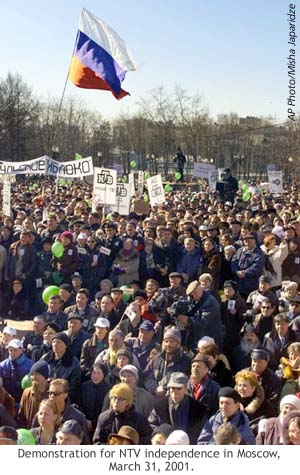Europe & Central Asia
2001
Attacks on the Press 2000: Spain
PRESS FREEDOM IS GENERALLY RESPECTED IN SPAIN, and CPJ does not routinely monitor conditions in the country. However, a series of attacks on journalists by the Basque separatist group ETA, including the murder of a prominent columnist from the Madrid daily El Mundo, greatly alarmed journalists during 2000, forcing many to leave the Basque region…
Attacks on the Press 2000: Tajikistan
ALTHOUGH CIVIL WAR NO LONGER RAGES IN TAJIKISTAN, popular unrest and an increasingly authoritarian regime have made conditions hard for journalists in the republic. Reporting remains a dangerous profession, especially for the few journalists who dare to investigate power struggles in the political and military elite or trafficking in weapons and drugs by criminal mafias.…
Attacks on the Press 2000: Turkey
In December 1999, the European Union (EU) finally agreed to accept Turkey’s application for membership. Yet questions remained about the government’s committment to the human-rights reforms needed to actually join the EU. If press freedom is any indicator, Turkey has a long way to go. Government censorship, criminal prosecutions, physical attacks, and imprisonment were among…
Attacks on the Press 2000: Turkmenistan
APPOINTED PRESIDENT FOR LIFE IN DECEMBER 1999, Turkmenistan’s President Saparmurat Niyazov heads an increasingly authoritarian and isolationist regime. Niyazov, known as Turkmenbashi, or “father of all Turkmen people,” ordered the burning of new history textbooks last year for not sufficiently emphasizing the Turkmen people’s historic role in the development of Central Asia and Europe.
Attacks on the Press 2000: Ukraine
LAST YEAR, PRESIDENT LEONID KUCHMA RAMPED UP his habitual censorship of anti-government newspapers and his attacks and threats against independent journalists. Late in the year, the abduction and presumed murder of Internet journalist Georgy Gongadze brought the plight of Ukrainian journalists into sharp relief, while allegations that Kuchma may have directed the killing sparked a…
Attacks on the Press 2000: Uzbekistan
AS PRESIDENT ISLAM KARIMOV’S GOVERNMENT CONTINUED its harsh crackdown on Islamic militants, officials kept local media on a tight leash. Uzbek human rights workers, themselves targets of bureaucratic harassment and violence, condemned numerous violations of the rights of their fellow citizens, including journalists. In April, CPJ raised the plight of three imprisoned Uzbek journalists in…
Attacks on the Press 2000: Yugoslavia
PROSPECTS FOR PRESS FREEDOM IN YUGOSLAVIA BRIGHTENED when President Slobodan Milosevic finally accepted election results and resigned on October 6. The elected dictator’s all-out war on the independent media was a thing of the past, but official habits of intimidating the press did not disappear, and the difficulty of reforming Serbia’s state-run media became evident.…
Attacks on the Press in 2000: Journalists in Prison
EIGHTY-ONE JOURNALISTS WERE IN PRISON AROUND THE WORLD at the end of 2000, jailed for practicing their profession. The number is down slightly from the previous year, when 87 were in jail, and represents a significant decline from 1998, when 118 journalists were imprisoned. While jailing journalists can be an effective means of stifling bad…

Gazprom completes NTV takeover
April 3, 2001, New York – Russia’s state-dominated gas monopoly Gazprom used a shareholders meeting today to take formal control of the independent Russian television network, NTV. The new management removed NTV founder Vladimir Gusinsky and managing director Yevgeny Kiselyov from the station’s board of directors
CPJ meets with Gazprom Media chief
New York, March 6, 2001 — Alfred R. Kokh, general director of Russia’s Gazprom Media, visited the New York offices of the Committee to Protect Journalists (CPJ) today to assert that his company’s long-running dispute with Vladimir Gusinsky’s NTV television network was purely a business matter. In the course of a two-hour meeting, CPJ executive…